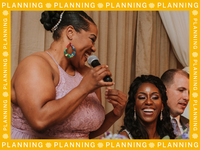Should You Consider a Church Wedding Ceremony? Here Are the Pros and Cons

If your faith is a central part of your life, you likely wish to have a church wedding ceremony. After all, what better way to start a marriage than to walk down the aisle of your hometown church to say your vows? Before you make a decision on a church ceremony, there are a few pros and cons to consider. If you decide on a Christian church wedding, you'll want to start your planning early.
Pros of a Church Wedding Ceremony
Celebrate Your Faith
The biggest reason to get married at your church is to proclaim and honor your faith. If you try to live your faith each day of your life, then it's only natural to make it a part of your wedding as well. Even if you believe God is everywhere, many Christians feel closer to Him at church. Choosing a church ceremony is a great way to connect with your faith on your Big Day.
Your Pastor, Priest or Preacher Can Perform Your Ceremony
Depending on your faith, some church leaders will only officiate ceremonies within their church. If you feel it is important for your pastor, priest or preacher to perform your ceremony, a church wedding may be required.
Plenty of Seating
Are you planning a big ceremony? If you choose a church wedding, you won't have to nix anyone from your guest list. Most churches can easily seat large parties. That's what they're built for.
Great Music
Most churches can either provide or help you arrange for the music during your ceremony. In fact, you can likely have the church band or choir perform during the ceremony. If you are a long-time member of the church, it may feel extra special to have the musicians you already know and love to be a part of your church wedding ceremony.
Cons of a Church Wedding Ceremony
Church Members Get Priority
Make sure you understand the rules and regulations of the church where you want to have your ceremony. In some cases, a church will only host a wedding if the bride and/or groom are a member of the church. If a church is willing to host non-member couples, you may be put on a waiting list or be expected to make an additional donation.
Not Every Type of Couple Is Allowed
More conservative branches of Christianity will not marry gay couples. Some of the strictest sects, including the Catholic Church, will also not marry anyone who is divorced unless they get their marriage annulled. Check with your church to make sure your marriage will be welcomed.
No Reception
The biggest drawback of a church ceremony is that you can't hold your reception in the church. You typically have to book a separate reception venue. In turn, this means that you and your guests will have to travel to the reception after your church ceremony.
Additional Steps
You and your future spouse may have to perform extra steps to marry in your church. For example, the Catholic Church requires brides and grooms to undergo Pre-Cana, a marriage preparation program. If one partner is a different religion, the strictest churches may also require the partner to convert.
Limited Decorations
If you hate decorating, this might actually be a pro. However, churches typically limit how much a couple can decorate the space. Most churches do allow flowers and aisle runners. Save your more elaborate decorations for your reception.
A Timeline for Preparing for Your Church Wedding Ceremony
12+ Months Before
- Begin to envision your wedding ceremony. Should it be long and symbolic? Short and sweet? Do you want to include all the wedding ceremony traditions or just the highlights?
- Pick wedding date and time preferences. Depending on your church, there may be times of year, or even times of the day, which are off-limits. Formal weddings are often held at noon, during High Mass, when a choir is available. A priest must clear weddings during Lent or Advent.
- Choose a location and officiant. Remember that most (or nearly all) priests won't marry couples outside a church. In fact, the wedding often must be held at the bride's home parish. The couple may need permission to marry in a different church.
- Explore your church's marriage requirements. You may have to show your baptismal certificate. Some churches require proof of communion and confirmation as well.
- If either you or your mate isn't Catholic, ask your priest about intermarriage requirements and possible conversion.
- If you're marrying in a Roman Catholic Church, you cannot remarry without an annulment if your first spouse is still alive. The process can be long and complicated, so if either one of you needs an annulment, start the paperwork now.
9-11 Months Before
- Meet with your officiant to discuss ceremony structure and marriage requirements. Your priest may want to help you to choose readings and blessings for the ceremony.
- Begin Pre-Cana, the premarital preparation program required by the Church.
- Ask your priest about dress requirements, such as covering one's shoulders for the bride. Also, inquire into any other rules specific to your ceremony site like no aisle runners or tossing items allowed.
- Choose your bridal party members. The Catholic Church prefers that both the best man and the maid of honor be Catholic (although only one must be). Make sure they understand what's involved.
6-8 Months Before
- Make arrangements with your church if you or other bridal party members want to participate in morning Mass and receive communion before the wedding.
- Consult with your stationer about invitations, programs, and place cards. You may want to order pew cards to ensure close family and friends are seated in the first few rows of the church.
- Choose ceremonial music and musicians. "Ave Maria" is traditionally sung at Roman Catholic weddings. Find out if the church provides performers.
3-4 Months Before
- Decide who will be part of the ceremony. Most churches allow two family members to read biblical passages during the ceremony.
- Consider ceremony and reception decoration needs, such as an aisle runner, flowers, wineglasses, and candles.
- Book a rehearsal-dinner site and finalize your guest list.
- If you are marrying in a Roman Catholic Church and wish to receive a Papal Blessing, contact the chancery office of your local diocese. They will send you an application to fill out and return to either the diocese or directly to an address in Rome (noted on the application). Some of the information that will be requested is the date of your ceremony and where it will take place, the phone number and address of the priest presiding over your wedding, and so on. There is a small donation fee, which varies from diocese to diocese. Return times also vary, from six weeks to two months.
2 Months Before
- Order ceremony programs if you plan to use them. It helps to have programs so your non-Catholic guests will understand the rich spirituality and symbolism of a Catholic wedding.
- Contact your church about posting Banns (a notice of your intention to wed). In the past, they were posted outside the church doors to allow anyone with valid reason to stop the wedding. Presently, Banns are printed in the church bulletin or announced during a Sunday service.
- Prepare and mail invitations. If you're concerned that your ushers won't know where to sit honorary guests, consider including pew cards for family and friends who should be seated in the first few rows of the church. Guests can present these cards to ushers at your ceremony as a sign that they should be seated in the reserved area. Otherwise, be sure to make introductions at the rehearsal dinner.
3-4 Weeks Before
- Have a final meeting with your priest.
- Finalize vows, readings, and other special ceremony details.
- Send rehearsal dinner invitations.
1-2 Weeks Before
- Touch base with your priest.
Day Before
- Rehearse the ceremony.



















